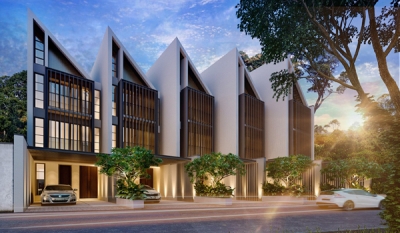Commenting on the launch of the company’s latest innovative offering, Eksith Hapangama - Managing Director of Landmark Developers explained the thought process behind the creation of “Nano Homes” and how it could provide a viable alternative to apartment living at a much cheaper price.
Within this context, given below are excerpts of the interview conducted with him.
Q: What is compact housing all about?
Colombo is becoming increasingly crowded.
It’s very difficult to find land to build on in the city so we have to look at the immediate suburbs where you can find quiet neighbourhoods and communities that are closer to nature but are not very far away from the city.
Within these neighbourhoods one can find small plots of land that are ideal for what we call compact housing solutions.
We have branded these solutions as “Nano Homes”.
We feel such compact housing solutions are the way forward in today’s market.
A typical Nano Home would be a two or three-storied home offering a total area of 1500 sq. ft upwards.
It consists of 2 parking bays, 2 or 3 bedrooms, 2 bathrooms, as well as a pantry, dining, kitchen and living room.
One of the most attractive features of Nano Homes is this compact beauty which is derived from the optimum use of the limited land space utilised to build the home on.
This compact nature of Nano Homes offers a sense of community by bringing people closer.
With apartments, you have to park somewhere, walk to the elevator, travel up several floors, walk down a corridor and enter your so-called home in the sky.
Why live cooped up in a box when you can live comfortably in a Nano Home?
With Nano Homes you have your own land, your own garage and your own backyard where you can relax with your friends or family.
And it’s all designed in the way you want.
You’re are not living in something generic designed without your preferences in mind, which is what happens with apartments.
Q: Who is your target audience for Nano Homes?
As home and apartment prices continue to rise, it is very difficult for certain segments of the market to invest in their own homes at the current market rates.
Nano Homes have been designed as an ideal solution for today’s younger generation looking to buy their first home.
They are also suited for elderly individuals who are in search of low-maintenance housing and close-knit communities to enjoy their retirement years.
Q: What are the benefits of Nano Homes when compared to apartments?
Nano Homes have several advantages when compared to apartments.
Firstly, you’re building a home on your own land.
It’s not a box in the sky with unknown neighbours on all sides.
Nano Homes are very reasonably priced as they are individual homes and not a part of an apartment complex with a fancy title which means that you have to pay above the actual value of the apartment.
With Nano Homes, you have the freedom and the flexibility to design and build your home based on your requirements and personal preferences.
The client can choose key features of the home such as the number of rooms, bathrooms and type of flooring, while also adding innovative elements to create a signature living space that is different from other Nano Homes.
They are also very easy and cheaper to maintain unlike apartments that come with significant recurring costs.
Last but not least, unlike apartment complexes built in residential suburbs and neighbourhoods, Nano Homes do not cause issues to the surrounding homes before, during and after construction.
Q: What are these issues caused by apartments in residential neighbourhoods?
Today’s news is full of stories about apartments causing huge problems in residential neighbourhoods.
Some of these apartment complexes are built on wetlands that have been filled in haphazardly.
This means that there is destruction of wildlife and the environment.
Wetlands play an important role in limiting the flooding in the city so when they get filled in, entire neighbourhoods are at the risk of being flooded during heavy rains.
When building an apartment complex there is a lot of piling that needs to be done.
This invariably causes cracks in neighbouring homes and also causes earth movements in the area.
Construction also means a lot of noise pollution and traffic congestion due to the transporting of heavy machinery and equipment.
Even after an apartment complex is opened, traffic in the neighbourhood can be an issue as vehicles will be moving in and out of the complex at regular intervals.
Q: What is Landmark’s experience in the housing market?
We have designed and built five super-luxury homes with modern amenities that are on par with international standards.
These homes are available for viewing at Thalangama.
In addition to our design and construction expertise, we also offer legal, financial and banking consultancy services.
We have also established strategic business partnerships around the globe.
We currently have a partnership in the US with a focus on the states of California and Texas.
In Australia, we are operating in Melbourne, Sydney, Perth and Brisbane through our real estate partners.
We also have warehousing facilities available in the Kelaniya and Gampaha regions.
Warehousing is faster and cheaper to build than a house and warehouse space is something required by most large companies so we've decided to expand into that area.
Q: Apart from Nano Homes, what are your other solutions?
At Landmark Developers, we also focus on the construction of low, mid and high-rise buildings for residential and commercial purposes including the management of such properties and provide construction expertise and services to clients.
We also have a product called “Comfort Dwellings” which comprises beautiful, affordable, high-quality homes with modern contemporary designs and architecture.
All of these homes will be custom-built with an emphasis on promoting a sustainable lifestyle.
They will be located in fast-developing suburban areas such as Thalahena, Malabe, Athurugiriya, Thalangama, Kaduwela, Kottawa, and Homagama.
Photo Caption - Managing Director of Landmark Developers Eksith Hapangama.























